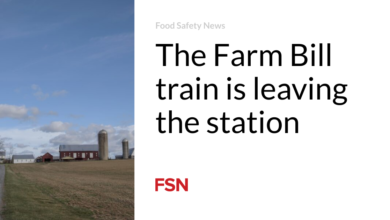USDA Easing Producers’ Transition to Organic Production with New Programs and Partnerships, Announces Investments to Create and Expand Organic Markets
WASHINGTON, May 15, 2024 – Agriculture Secretary Tom Vilsack today announced new programs, partnerships, grant awards and an additional $10 million in funding to expand the markets for organic products and help producers transition to organic production. These programs will support the development of new and better markets for domestic organic products, provide hands-on training to producers transitioning to organic production and ease the financial burden of obtaining organic certification.
“Offsetting the costs for organic transition helps more farmers realize higher margins sooner while giving consumers more access to high-demand organic products,” Secretary Vilsack said. “The partnerships and technical support we offer will ease the transition for producers, and the investments in grant projects we are announcing today will reduce the organic industry’s reliance on imports, lower cost barriers for businesses transitioning to organic, and address crucial infrastructure needs. Together, these resources ensure small and mid-sized producers can gain access to new, profitable markets and further our commitment to maximize American farmers’ share of the food dollar.”
Today’s announcements build on USDA’s comprehensive approach to supporting local and regional food systems, expanding access to markets to more producers, and increasing the affordable food supply for more Americans while promoting climate-smart agriculture and ensuring equity for all producers. USDA recognizes that smaller and mid-sized food and farm businesses are essential to a strengthened food supply chain. Launched in 2022, the Organic Transition Initiative (OTI) offers a suite of programs and resources to help existing organic farmers and those transitioning to organic production and processing. Other efforts under OTI include AMS’ National Organic Program’s (NOP) Transition to Organic Partnership Program (TOPP). TOPP builds mentorship relationships between transitioning and existing organic farmers to provide technical assistance and wrap-around support in six U.S. regions. Additionally, USDA’s Risk Management Agency administers federal crop insurance products, including Whole Farm Revenue Protection and Micro Farm, which may be good options for organic producers.
Supporting the development of new and better markets for domestic organic producers
USDA’s Agricultural Marketing Service (AMS) today awarded approximately $24.8 million for 23 grant projects through the Organic Market Development Grant (OMDG) program. These projects will support the development of new and existing organic markets to increase the consumption of domestic organic agricultural products. The projects funded through this program so far, are anticipated to benefit more than 49,000 producers and over 118 million consumers by increasing organic market opportunities.
With today’s announcement, AMS has awarded a total of $75.2 million to 93 projects across the nation through the Organic Market Development Grant program to increase the availability and demand for domestically produced organic agricultural products and to address the need for additional market paths. AMS previously announced awards through this program in January and March 2024.
USDA has made an additional $10 million available through the program. Awards for this funding will be selected from the existing applicants and will be announced this summer.
This round of awards is for the market development and promotion, simplified equipment-only, and processing capacity expansion project types and is funded by the Commodity Credit Corporation.
Recipients of this funding include:
- North Country Smokehouse, in Claremont, N.H., will introduce two new innovative organic pork products to the domestic organic market. Using OMDG funds, North Country Smokehouse will procure and install new processing equipment, develop distinctive packaging designs, and coordinate retail merchandising to optimize product visibility. The project is expected to increase production capacity by 175,000 pounds of organic meat annually.
- The DeLong Co, Inc., in Clinton, Wis., will invest in critical infrastructure, equipment, and transportation capabilities to address the barriers of limited storage capacity, inadequate quality control measures and transportation constraints. The project is expected to create demand for over 36 million pounds of organic corn by increasing current storage capacity by 140,000 bushels, implementing proper equipment to segregate organic corn from conventional corn, and adding railcars.
- Wai’anae Community Re-Development Corporation, in Waianae, Hawaii, will maximize processing capabilities within MA’O Organic Farms’ newly constructed wash-pack facility by introducing product inventory management and food safety technologies, supporting MA’O’s ability to handle 10 times more products while maintaining and eventually increasing product inventory and throughput of organic produce to ensure products are distributed to a greater diversity of market segments.
A full list of awarded projects is available on the OMDG webpage.
AMS gave priority consideration to projects addressing specific pinpointed market needs for organic grains and livestock feed, organic dairy, organic fibers, organic legumes and other rotational crops, and organic ingredients currently unavailable in organic form.
Providing hands-on training to producers transitioning to organic
The U.S. Department of Agriculture’s (USDA) Natural Resources Conservation Service (NRCS) is awarding $5 million to Oregon Tilth and Organic Farming Research Foundation to strengthen organic expertise for conservation program assistance and expand relationships among producers wanting to transition to organic. The Foundation will disseminate the latest in organic research and national training to NRCS staff and Oregon Tilth will establish six organic specialists who will support producers through regional networks and hands-on organic training, and support NRCS staff who assist farmers transitioning to organic. The organic specialist positions will be filled by staff from Oregon Tilth working with organic partners including Marbleseed, California Certified Organic Farmers Foundation, and Organic Agronomy Training Service.
These five-year partnerships with the Oregon Tilth and Organic Farming Research Foundation are part of NRCS’s Organic Transition Initiative (OTI), a Department-wide effort to support agricultural producers interested in transitioning to organic. Additionally, NRCS encourages all organic and transitioning producers to apply for assistance through its conservation programs that currently have boosted funding from the OTI as well as the Inflation Reduction Act. Assistance includes a new organic management standard, which was introduced last year, to allow producers flexibility to get assistance and education, such as attending workshops or requesting help from experts or mentors.
In 2023, NRCS allocated $12 million in 22 states, signing 112 contracts with transitioning producers. To apply, producers should contact NRCS at their local USDA Service Center.
Easing the financial burden of obtaining organic certification
Through the Organic Certification Cost Share Program (OCCSP), USDA’s Farm Service Agency (FSA) will cover up to 75% of organic certification costs at a maximum of $750 per certification category.
OCCSP provides cost-share assistance to producers and handlers of organic agricultural commodities for expenses incurred obtaining or maintaining organic certification under USDA’s National Organic Program. Eligible OCCSP applicants include any certified organic producers or handlers who have paid organic certification fees to a USDA-accredited certifying agent.
Cost share assistance covers expenses including application fees, inspection costs, fees related to equivalency agreement and arrangement requirements, inspector travel expenses, user fees, sales assessments and postage. OCCSP pays a maximum of $750 per certification category for crops, wild crops, livestock, processing/handling, and state organic program fees (California only).
Organic producers and handlers should apply for OCCSP by the Oct. 31, 2024, deadline for eligible expenses incurred from Oct. 1, 2023, to Sept. 30, 2024. FSA will issue payments as applications are received and approved. To apply, producers and handlers should contact FSA at their local USDA Service Center and be prepared to provide documentation of organic certification and eligible expenses. OCCSP applications can be submitted to USDA or through participating state departments of agriculture, but not both. For more information, visit the OCCSP webpage.
FSA also is accepting applications from state departments of agriculture to administer OCCSP. FSA posted a funding opportunity summary on grants.gov and will electronically mail the Notice of Funding Opportunity to all eligible state departments of agriculture. Applications from state departments are due July 12, 2024.
Organic producers and handlers should apply for OCCSP by the Oct. 31, 2024, deadline for eligible expenses incurred from Oct. 1, 2023, to Sept. 30, 2024. FSA will issue payments as applications are received and approved.
To apply, producers and handlers should contact FSA at their local USDA Service Center and be prepared to provide documentation of organic certification and eligible expenses. OCCSP applications can be submitted to USDA or through participating state departments of agriculture, but not both. For more information, visit the OCCSP webpage.
For more information, visit www.farmers.gov/organic.
USDA touches the lives of all Americans each day in so many positive ways. Under the Biden-Harris administration, USDA is transforming America’s food system with a greater focus on more resilient local and regional food production, fairer markets for all producers, ensuring access to safe, healthy and nutritious food in all communities, building new markets and streams of income for farmers and producers using climate smart food and forestry practices, making historic investments in infrastructure and clean energy capabilities in rural America, and committing to equity across the Department by removing systemic barriers and building a workforce more representative of America. To learn more, visit www.usda.gov.
#
USDA is an equal opportunity provider, employer, and lender.



